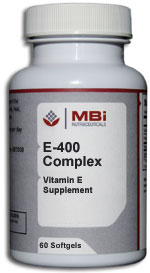E-400 Complex - 60 SG
NUTRITIONAL FUNCTIONS
Vitamin E is an anti oxidant. It prevents saturated fatty acids and Vitamin A from breaking down and combining with other substances that may become harmful to the body. Fat oxidation results in the formation of free radicals. Free radicles are highly destructive molecules that can cause extensive damage to the body.
The Vitamin B complex and Vitamin C are also protected against oxidation when Vitamin E is present in the digestive tract. Fats and oils containing Vitamin E are less susceptible to rancidity than those devoid of Vitmain E. Vitmain E has the ability to unite with oxygen and prevent it from being converted into toxic peroxides; this leaves the red blood cells more fully supplied with the pure oxygen that the blood carries to the heart and other organs.
Vitamin E plays an essential role in cellular respiration of all muscles, especially cardiac and skeletal. Vitamin E makes it possible for these muscles and their nerves to function with less oxygen, thereby increasing their endurance and stamina. It also causes dilation of the blood vessels, permitting a fuller flow of blood to the heart. Vitamin E is a highly effective antithrombin in the bloodstream, inhibiting coagulation of blood by preventing clots from forming. It also aids in bringing nourishment to the cells, strengthening the capillary walls, and protecting the red blood cells from destruction by poisons, such as hydrogen peroxide, in the blood.
Vitamin E is effective in the prevention of elevated scar formation on the body surface and within the body. In ointment from it is used on burns to promote healing and lessen the formation of scars. It stimulates urine excretion, which helps heart patients whose body tissues contain an excessive amount of tissue fluid. As a diuretic, Vitamin E helps lower elevated blood pressure. It protects against the damaging effects of many environmental poisons in the air, water and food. It protects the lungs and other tissues from damage by polluted air.
Vitamin E works with selenium to protect the liver and other organs from damage from oxygen depriving free radicals and to build up and help prevent lactic acid build up. Vitamin E promotes the healing of all tissues, organs, and cells, including the heart, reproductive organs, brain and cerebellum. It aids cellular and blood respiration and maintains membrane metabolism. It is needed for the formation of the nucleus of each body cell, including RNA and DNA.
Deficiencies of Vitamin E result in poor healing, open sores, destructed blood cells, tissues, ligaments and tendons, necrosis of the liver and weight loss. It also affects circulation, impaired nerve transmission, improper metabolism of proteins and fat, retarded growth, weakness, myocardial infarction and arterial degeneration.


